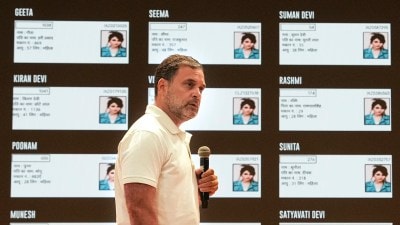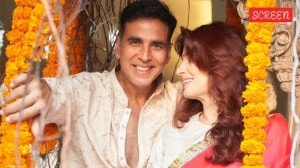‘An award is confirmation I can act’
SHOBANA breezes into the room, apologising even as she walks in. ‘‘Sorry, I didn’t think the photo shoot would take up so muc...

SHOBANA breezes into the room, apologising even as she walks in. ‘‘Sorry, I didn’t think the photo shoot would take up so much time,’’ she says by way of explanation for her delayed arrival. But then, ever since she won her second National Award for Best Actress for her role in Revathy’s Mitr – My Friend, her hectic schedule has become even more so. Dance is a priority, as is Pamela Rooks’ big-screen adaptation of Mahesh Dattani’s Dance Like A Man, scheduled to go on the floors in January 2003.
Despite that, Shobana looks much like you expect a movie star to, perfectly groomed and coiffed. Before the interview gets off the ground, there’s one question from her: ‘‘What would you like to have?’’ ‘‘Coffee,’’ I answer. ‘‘The usual?’’ she queries. I say yes and she calls in one of her assistants to order one regular coffee for me, and one ‘unusual’ coffee for her. Before I can figure out what that is, we’re discussing the award for Mitr.
Even after all these years, Shobana regards the award, which she shares with Tabu (Chandni Bar) as a shot in the arm. ‘‘It’s a big confidence boost,’’ she confesses. ‘‘When I look at my old films, I wince. It’s good to get confirmation that I can act.’’
The acknowledgement has put Shobana in a meditative mood. ‘‘I thought I’d achieved everything when I won my first National Award (for playing a woman with a split personality) for the Malayalam film Manichitrathazu in 1994. But looking back today, I feel I’ve wasted a lot of time. Given today’s frenetic pace of filmmaking, you don’t stop to think about what you’re doing. So you end up doing the same things… making the same gestures, mouthing the same dialogues. It’s only now that this awareness has dawned upon me.’’
This is why dance is the big passion with her now. Shobana’s been busy running a Bharatanatyam school in Chennai’s Mylapore area, a bastion of Tamil Brahminical culture in a state better known for its Dravidian ideological excesses. ‘‘In films, you are just one among many players,’’ she points out. ‘‘There’s only so much you can do. However, with dance it’s different. There’s so much one can do: choreography, costumes, sets.’’
This is not to say that Shobana has lost interest in films. With a toss of her head, she says that she bristles when people ask her which is her real passion: cinema or dance. ‘‘I did a lot of films, and enjoyed doing them,’’ she tells you. Right from her first film Mangalanayaki in 1979, where she plays a young girl with a heart condition, to Agni Sakshi, her last, an art film that failed to click despite ‘‘great potential’’, through trysts with Tamil and Telugu cinema, the films just kept rolling.
‘‘Perhaps it’s my Kerala background (she’s the niece of the famous Travancore sisters, Lalita, Padmini and Ragini), but I’ve always wanted to do good films,’’ she says. It’s not that she’s against commercial films — ‘‘they’re my bread and butter,’’ she admits — but Shobana’s always on the look-out for different roles. Just like her coffee — ‘‘more water than coffee,’’ she elucidates finally — they have to be tailormade for her.



- 01
- 02
- 03
- 04
- 05




























